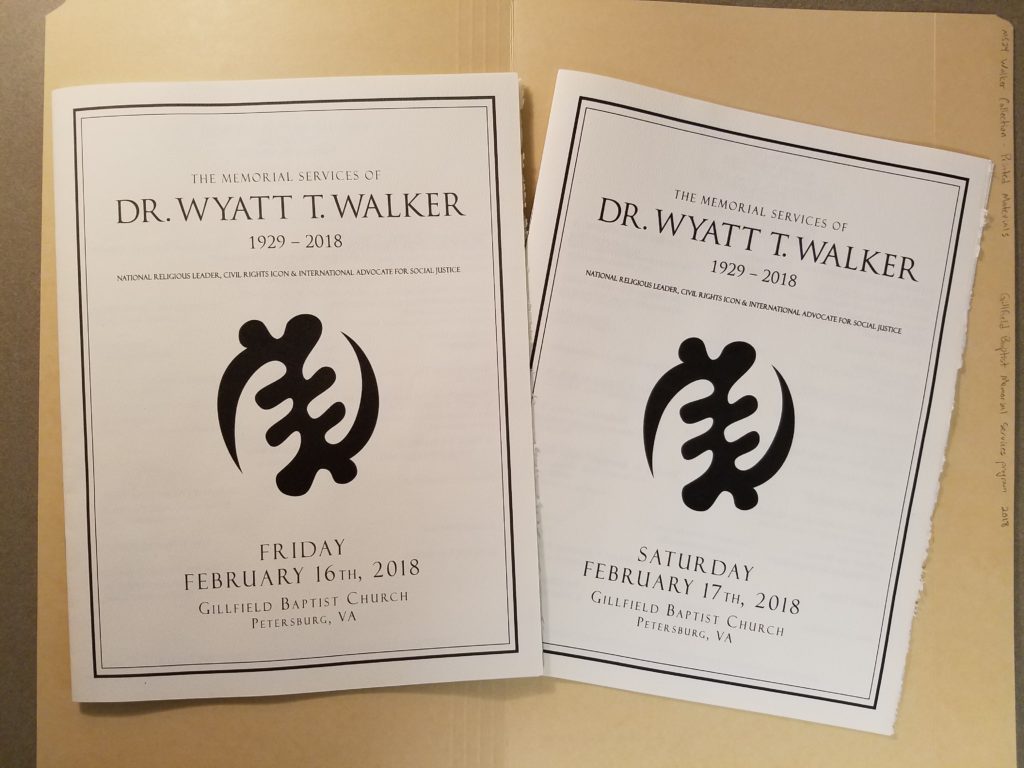(Note: This post was authored by Taylor McNeilly, Processing & Reference Archivist.) This past weekend, the first two of three memorial services in honor of and originally planned by Dr. Walker were held. Both services were held at Gillfield Baptist Church in Petersburg, VA, the first church where Dr. Walker served as pastor. The third memorial service, to be held in a few weeks, will be at Canaan Baptist Church of Christ in Harlem, NY, where Dr. Walker finished his pastoral career. Several members of the administration and staff of the University of Richmond were in attendance at this weekend’s services, including myself, so for this week’s #WyattWalkerWednesday, I’d like to talk a little bit about the services and how, in my work as an archivist, preserving the memorial service is an important part of adding to the Dr. and Mrs. Wyatt Tee Walker Collection.

Friday and Saturday programs for the Gillfield Baptist Church memorial services honoring Dr. Walker.
The services were beautiful, passionate, and deeply moving. The community’s love for Dr. Walker and continued support for his family and his causes was apparent throughout. In the past, you’d have to take my word as a firsthand account, but living in the Digital Age does have some benefits. In consideration for Dr. Walker’s international legacy, Gillfield set up an online live stream of both services, viewable around the world. The church then took it a step further, recording the live stream and posting it on YouTube for anyone to see. Both services are approximately 2 hours long and are available on YouTube in their entirety on Gillfield’s YouTube channel. A direct link to Friday’s service can be found here, while Saturday’s service is available here. As a pianist of 20-some years myself, I was particularly moved by the piano hymn performed during Saturday’s performance. The performer was not only impressively skilled in performance, but worked as an editor with Dr. Walker on his publication, The African American Heritage Hymnal. (As a note, there are several other memorial videos to Dr. Walker on YouTube, as well as historic footage of him throughout his life.)
In the past, an archives that is preserving the memorial services of anyone, including a man as prominent and accomplished as Dr. Walker, would collect the services’ programs, as well as any newspaper clippings about the services, including the obituary and any published firsthand accounts. While we are collecting all the obituaries and other newspaper articles we come across, and I made sure we had two copies of the services’ program, the digital recording of both services offers a relatively new and deeply significant way to preserve the memory of Dr. Walker’s legacy.
I want to address that distinction a little as well. The material donated by Dr. Walker and his wife could be considered the physical evidence of Dr. Walker’s legacy, the left behind items that document his work and his life in the most direct way possible. Many of these items, however, do not document his personal effect on individuals, or the way that his legacy has affected the world at large. The memorial services, on the other hand, focus almost entirely on how those who knew Dr. Walker best remember his legacy and its effects on the world, showing a deeply personal view of the man that his collection could never match. Viewed in this light, preserving the memorial services becomes a matter of the greatest importance, as they are the only way to hold onto this unique aspect of Dr. Walker’s life and work.
